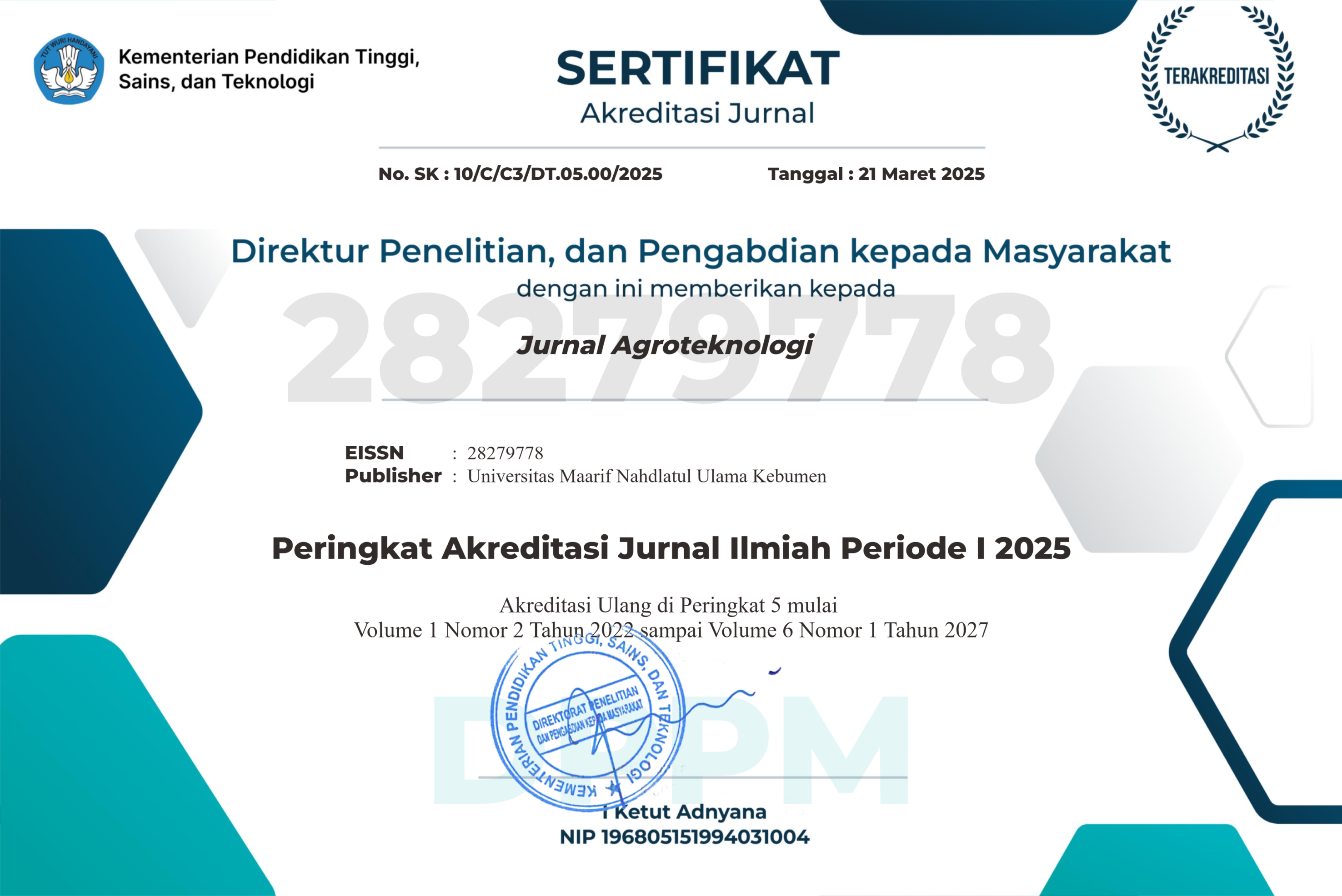Analisis Indeks Kualitas Tanah pada Tipe Penggunaan Lahan Berbeda di Kecamatan Maginti
DOI:
https://doi.org/10.53863/agronu.v3i01.564Keywords:
Soil Quality Index, Irrigated Rice Fields, Non-Irrigation, Soil Management, Physical Properties of Soil Chemistry.Abstract
Soil quality is the ability of the soil to function to maintain plant productivity, maintain and maintain water availability and support human activities. The purpose of this study was to determine the Soil Quality Index (SQI) and determine the management direction for improving soil quality on different land uses in the Maginti sub-district. A field study and laboratory analysis were carried out from March to May 2022. The method used in this study was a free survey method through field observations conducted on 2 types of land use, namely irrigated rice fields and dry land. In irrigated rice fields, 3 sample points were taken and 3 sample points in dry land, then composited into 1 sample in order to represent the total amount of each land use. In calculating the value of the soil quality index using the formula by Bajracharya (2006) which has been modified by Ghimire (2018). The soil quality index is analyzed using the indicators that best represent soil functions. The variables observed included Texture, pH, C-Organic, N-Total, P-Available and K-Available. Soil quality index values range from 0-1, the higher the index value, the better the quality. The results of the analysis of the selected soil functions (minimum data set/MDS) and the MDS scoring were summed to determine the value of the soil quality index (SQI). The conclusion of this research is that the criteria for medium soil quality are irrigated rice fields with SQI (0,56) and dry land with low criteria with SQI (0,36). To improve soil quality in irrigated paddy fields and dry lands is to increase organic matter through the application of organic fertilizers with the right dosage according to the type and level of soil fertility.
Keywords: Soil Quality Index, Irrigated Rice Fields, Non-Irrigation, Soil Management, Physical Properties of Soil Chemistry.
References
Agoesdy, R., H. Hanum., A. Rauf dan F.S. Harahap. 2019. Status Hara Fosfor Dan Kalium Di Lahan Sawah Di Kecamatan Tanjung Morawa Kabupaten Deli Serdang. Jurnal Tanah dan Sumberdaya Lahan. 6 (2):1387-1390.
Alibasya, M.R. 2001. Efek System Olah Tanah dan Mulsa Jagung Terhadap Stabilitas Agregat dan Kandungan C-Organik pada Tanah Ultisol pada Musim tanaman Ketiga. Jurnal Agrista. 5(1): 50-57.
Badan Pusat Statistik. 2021. Kabupaten Muna Barat dalam Angka 2021. Badan Pusat Statistik Muna Barat.
Balai Penelitian Tanah. 2009. Analisis Kimia Tanah, Tanaman, Air dan Pupuk. Petunjuk Teknis Edisi 2. Bogor.
Dikti Direktorat Jenderal Pendidikan Tinggi. 1991. Kesuburan Tanah. Jakarta
Departemen Pendidikan dan Kebudayaan.
Ghimire, P., Bhatta, B., Pokhrel, B., Sharma, B., & Shrestha, I. 2018. Assessment of Soil Quality for Different Land Uses in the Chure Region of Central Nepal, Jurnal of Agriculture and Natural Resources. 1(1): 32-42.
Ginting, Rosmenda, Sulkifli N. 2013. Pemetaan Status Unsur Hara C-Organik dan Nitrogen di Perkebunan Nanas Rakyat Desa Panribuan Kecamatan Dolok Silau Kabupaten, Jurnal Online Agroekoteknologi. 1(4): 1308-1318.
Muliana., Anwar. S., Hartono. A., Susila. A. D., dan Sabiham. S. 2018. Pengelolaan dan Pemupukan Fosfor dan Kalium Pada Pertanian Intensif Bawang Merah di Empat Desa di Brebes. Jurnal Holtikultura Indonesia. 9 (1).:27-37.
Mausbach, M. J and C. A. Seybold. 1998. Assesment of Soil Quality. In Soil Quality and Agriculture Sustainbility. Michigan. Ann Arbor Press.
Nuha, U., Kusuma, D., Aprilia, R. L., & Rahmawati, A. (2022). Pertumbuhan Dan Hasil Jagung Hibrida Pulut Putih Dengan Ideotip Tanaman Tegak Di Kabupaten Banjarnegara. Agronu: Jurnal Agroteknologi, 1(01), 36-42.
Rahmawati, A., & Fitrianingsih, D. (2023). Aplikasi Bioteknologi pada Tanaman sebagai Alternatif Pencegahan Krisis Pangan. Agritechpedia: Journal of Agriculture and Technology, 1(01), 57-63.
Rukmi, Bratawinata, A.A., Pitopang, R., Matius,P. 2017. Sifat fisik dan kimia tanah pada berbagai ketinggian tempat di habitat eboni (Diospyros celebica Bakh.) DAS Sausu Sulawesi Tengah. Jurnal Warta Rimba. 5 (1): 28-36.
Siregar, B. 2017. Analisa Kadar C-Organik dan Perbandingan C/N Tanah di Lahan Tambak Kelurahan Sicanang Kecamatan Medan Belawan. Jurnal Warta Edisi, 1-14.
Sakti, Pramuda, Purwanto, Slamet M, Sutopo. 2011. .Status Ketersediaan Makronutrisi (N, P, dan K) tanah sawah dengan Teknik dan Irigasi Tadah Hujan di Kawasan Industri Karanganyar,Jawa Tengah. Bonorowo Wetlands. 1(1): 819.
Supriyadi. 2018. Perspektif Keamanan dan Kualitas Tanah dalam Pertanian Keberlanjutan. Pidato Pengukuhan Guru Besar Fakultas Pertanian Universitas Sebelas Maret. Surakarta.
Olafisoye BO, Oguntibeju OO, Osibote OA. 2016. An assessment of the bioavailability of metals in soils on oil palm plantations in Nigeria. Polish. Journal of Environmental Studies. 25(3): 11-25
Zulkarnain, A., Aprillya, M.R., Suryani E. 2013. Analisis Kualitas Hasil Panen Padi untuk mendukung ketahanan Pangan. Procedia Ilmu Komputer. 16 (1):919-92
Downloads
Published
How to Cite
Issue
Section
License
Copyright (c) 2024 Sri Jumiun,Darwis Darwis,Namriah Namriah,Sahta Ginting,Sitti Leomo,Zulfikar Zulfikar

This work is licensed under a Creative Commons Attribution-ShareAlike 4.0 International License.
Authors retain copyright and grant the journal right of first publication with the work simultaneously licensed under a Creative Commons Attribution-ShareAlike 4.0 International License that allows others to share the work with an acknowledgment of the work’s authorship and initial publication in this journal











